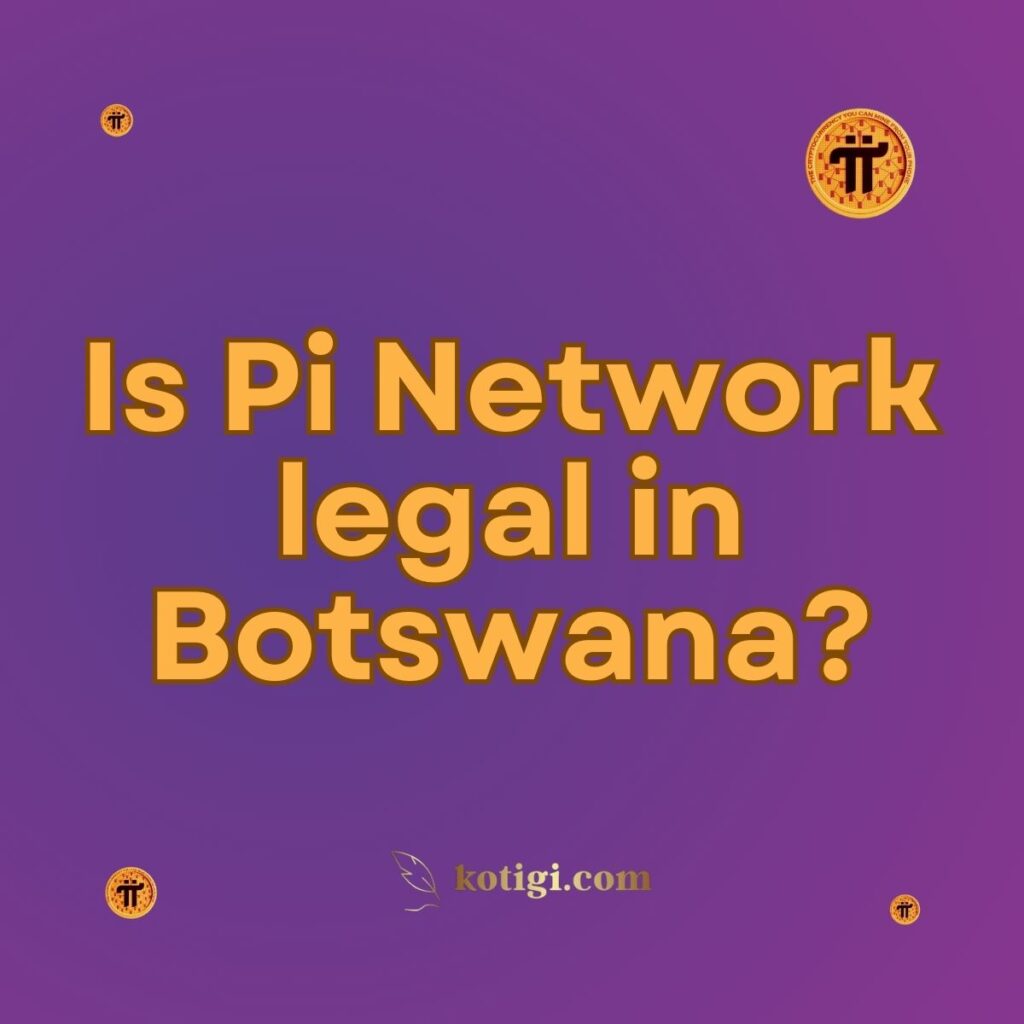
Is Pi Network legal in Botswana?
Yes, Pi Network is legal in Botswana. While the country has not established specific cryptocurrency regulations, using Pi Network is allowed as long as individuals comply with existing financial and anti-money laundering (AML) laws.
Introduction
As Pi Network continues to expand its user base across Africa, many people in Botswana are curious about the platform’s legal status in the country. Botswana has shown an interest in fintech and digital innovations, but the regulatory landscape for cryptocurrencies remains underdeveloped. This article explores the legality of Pi Network in Botswana, its alignment with financial laws, and what users need to know about operating within legal boundaries.
Overview of Cryptocurrency Regulations in Botswana
Botswana, like many countries in Africa, has not yet implemented comprehensive regulations for cryptocurrencies. The lack of official guidelines means that platforms like Pi Network can operate without legal barriers, as long as users comply with broader financial laws. While there is no explicit prohibition, the government has warned citizens to be cautious when dealing with cryptocurrencies, as the market is still largely unregulated.
Botswana’s Financial Authorities and Their Stance on Cryptocurrencies
The Bank of Botswana, the country’s central bank, has not issued any formal regulations concerning the use of digital currencies like Pi Network. However, the institution has been monitoring developments in the cryptocurrency sector. Although no specific rules govern cryptocurrency transactions, the Bank of Botswana advises consumers to be aware of potential risks and exercise caution when using such platforms.
The Role of the Non-Bank Financial Institutions Regulatory Authority (NBFIRA)
Botswana’s Non-Bank Financial Institutions Regulatory Authority (NBFIRA) oversees various financial entities, but cryptocurrencies currently fall outside their purview. While NBFIRA has not regulated Pi Network or any other cryptocurrencies, it’s essential for users to stay compliant with existing financial transaction rules and ensure that they follow anti-money laundering (AML) guidelines.
Pi Network’s Legality in Botswana
Pi Network’s decentralized nature makes it possible for users to participate from anywhere in the world, including Botswana. As there are no laws prohibiting the use of cryptocurrencies, Pi Network is legal in Botswana. However, users should be mindful of general financial laws that apply to all transactions, especially those that aim to prevent fraud and illicit activities.
Is Pi Network Recognized as Legal Tender?
Although Pi Network is legal to use in Botswana, it is important to note that cryptocurrencies, including Pi, are not recognized as legal tender. This means that while you can mine and use Pi for certain transactions or exchanges, it cannot be used to pay for goods and services in the same way as Botswana’s official currency, the pula (BWP).
KYC Compliance for Pi Network Users in Botswana
To ensure a secure and transparent platform, Pi Network requires users to go through a Know Your Customer (KYC) process. This is a critical step in ensuring compliance with global anti-money laundering (AML) regulations. For users in Botswana, completing KYC verification helps establish the legitimacy of their participation and ensures they are not engaging in illegal activities on the platform.
Legal Considerations for Pi Network Users in Botswana
Although Pi Network is legal, users must still navigate the broader legal framework that applies to digital transactions in Botswana. This includes adhering to anti-money laundering laws, protecting consumer rights, and staying aware of financial risks associated with cryptocurrencies.
Anti-Money Laundering (AML) Regulations
Botswana has stringent anti-money laundering (AML) regulations, which apply to all financial transactions, including those involving digital currencies. Pi Network users must ensure that they comply with these regulations by participating in KYC verification and avoiding suspicious activities that could trigger investigations.
Consumer Protection and Cryptocurrency Risks
Botswana’s central bank has not yet provided consumer protection laws specific to cryptocurrencies. As a result, users must be cautious when engaging in cryptocurrency transactions, including those on Pi Network. It is important for users to keep their wallet passphrases secure and avoid falling prey to scams or fraudulent schemes that can result in financial losses.
The Future of Cryptocurrency Regulation in Botswana
As cryptocurrencies become more popular globally, Botswana may eventually introduce regulations that address digital currencies like Pi Network. These laws could clarify the legal status of cryptocurrencies, establish tax obligations, and offer protection for consumers. For now, Pi Network operates in a legal gray area, where it is not banned but not fully regulated either.
Potential for Regulatory Development
The Bank of Botswana may eventually follow the lead of other central banks in Africa by developing specific cryptocurrency guidelines. As more residents begin using Pi Network and other digital currencies, the government may see the need to regulate this growing sector. This could include measures to prevent fraud, tax cryptocurrency transactions, or introduce consumer protections.
Comparing Botswana’s Approach to Other African Countries
Many African countries are grappling with the rise of cryptocurrencies, with varying regulatory approaches. In comparison to countries like Nigeria, which has placed restrictions on financial institutions dealing with cryptocurrency, Botswana’s approach is more open, with no direct restrictions on cryptocurrency use.
The Role of Cryptocurrencies in Botswana’s Digital Economy
Botswana’s interest in fintech and digital innovation could make cryptocurrencies like Pi Network a valuable tool in the country’s digital economy. With the right regulatory framework in place, Pi Network could contribute to financial inclusion, allowing more people to access decentralized financial systems.
Opportunities for Pi Network in Botswana
Pi Network offers users in Botswana the opportunity to engage in cryptocurrency mining with minimal resources. By simply using their smartphones, people can participate in Pi’s decentralized network and potentially benefit from the platform’s growth. This aligns well with Botswana’s push towards embracing digital technologies and fostering innovation in its economy.
Challenges Facing Cryptocurrency Adoption
Despite the opportunities, several challenges remain for cryptocurrency adoption in Botswana. These include the lack of formal regulation, potential risks of fraud, and limited awareness of how cryptocurrencies function. Pi Network users must be prepared to navigate these challenges and exercise caution when interacting with digital assets.
Practical Tips for Pi Network Users in Botswana
Given the current legal environment, it is important for Pi Network users in Botswana to take a few practical steps to ensure they are using the platform safely and responsibly.
Secure Your Pi Wallet
As with any cryptocurrency, protecting your digital assets is crucial. Pi Network users should safeguard their Pi wallets by using strong passwords, securing their passphrases, and avoiding phishing schemes. Any loss of access to a Pi wallet could result in the loss of mined Pi, as blockchain transactions are typically irreversible.
Complete KYC Verification
To remain compliant with Pi Network’s global standards and Botswana’s financial laws, users should complete the KYC process. This adds a layer of security and ensures that users are not engaging in illicit activities on the platform.
Stay Informed About Legal Changes
As the cryptocurrency landscape in Botswana could change, it is important for users to stay informed about any new regulations that may be introduced. Keeping an eye on the legal environment will help Pi Network users adapt to new rules and continue using the platform responsibly.
Conclusion
Pi Network is currently legal in Botswana, with no specific regulations prohibiting its use. However, users should remain cautious and comply with general financial laws, including anti-money laundering regulations. As Botswana’s regulatory landscape evolves, Pi Network users must stay informed and be prepared to adapt to potential changes.
Key Takeaways
- Pi Network is legal in Botswana, as there are no specific cryptocurrency regulations in place.
- The Bank of Botswana has not yet regulated digital currencies, but users are advised to exercise caution.
- KYC compliance is required for all Pi Network users to ensure adherence to anti-money laundering (AML) laws.
- Users should protect their Pi wallets by following security best practices to avoid scams and fraud.
- Future regulations may impact Pi Network’s legality, so users should stay informed about changes in the legal landscape.





